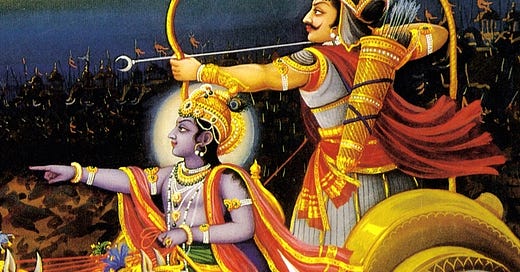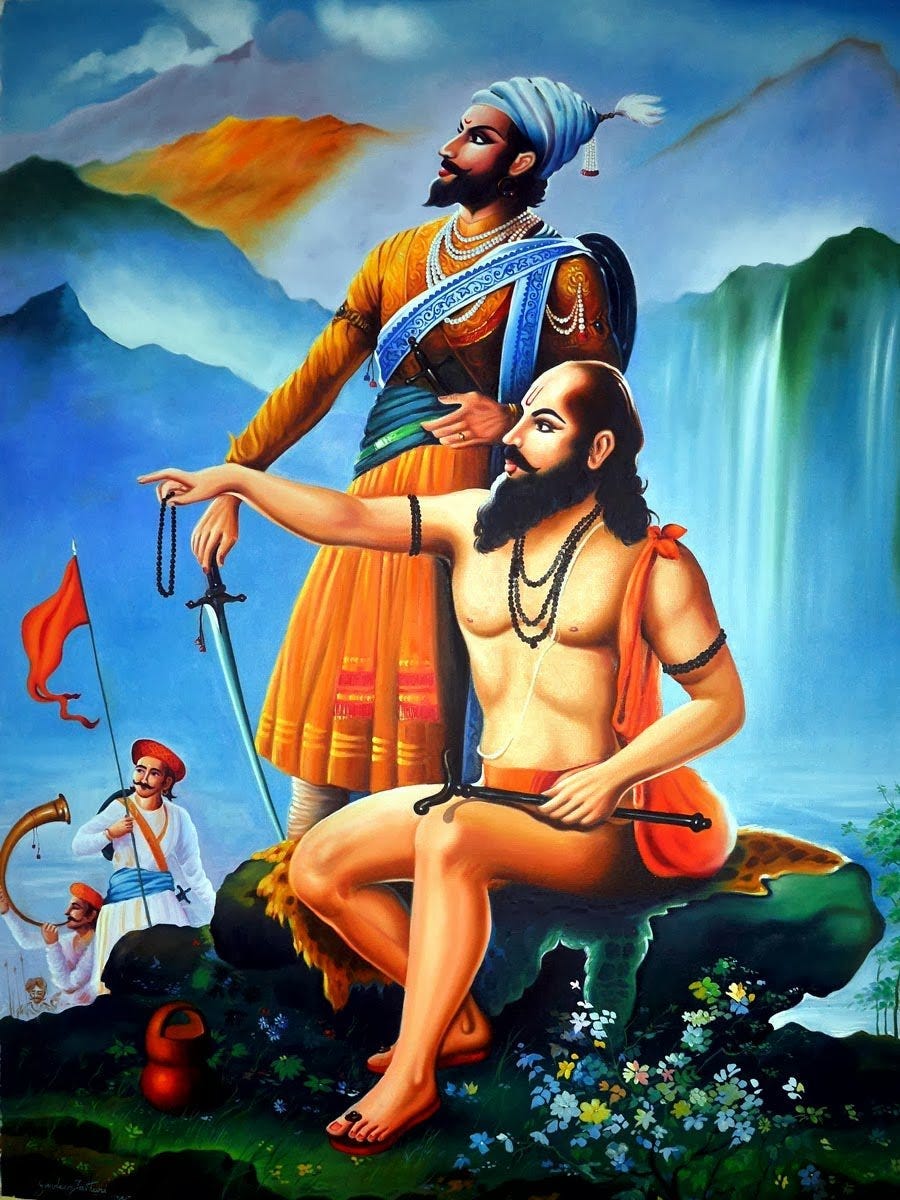Work for work's sake: Nishkam Karma
Eastern Wisdom Weekly #6: The story of the great king Shivaji Maharaj, and how we did not lose a great king to renounciation.
Happy Tuesday everyone 🌞 Yesterday, marked the birth of one of the greatest kings who lived on this land, Chhatrapati Shivaji. His efforts for reconciling the Hindu Dharma, forming the framework for India’s Naval command, to maintaining a harmonious empire are commendable. But there was a time, when the great king had a dilemma, and had to choose whether he wanted to rule as a king or to live his life like a monk.
Shivaji Maharaj was always an ardent follower of his teacher Samarth Ramdas who was a great saint of that time. The king was always pleased in his teacher’s presence and slowly he developed the idea of renunciation in him. He started feeling aloof and wanted to leave his kingdom and renounce everything.
The great king Shivaji with his teacher Swami Samarth Ramdas.
This was sensed by his teacher, and he advised him not to renounce the kingdom as a man with his potential is born once in a hundred years, if a king like him renounces everything, the overall prosperity of his subjects will be subject to invasive forces who wanted to crush the empire. But since the king was also adamant about the renunciation, his teacher taught him how to rule his kingdom with Vairagya (dispassion).
Dispassion doesn’t mean that you will be sad or depressed, and won’t enjoy the world, it just means that a person should be aware of the concept of what is real and what is not. Any work done with involvement but without being attached to it is the whole principle of Karma Yoga (union through dispassionate efforts). Yet another aspect of this is, that if people with higher and more important responsibilities are greedy, power-hungry, and extortive of their subjects, then definitely such a person can cause trouble on a massive scale. Individual needs vs the well-being of others.
Krishna guides Arjuna through the philosophies of Karma, on the battlefield.
So, the next time you have thoughts of leaving everything and just escaping to forests and meditating on the Himalayas, think of this. A person with a potential gift to serve and impact others positively will be lost. It is not necessary to leave everything and go to mountains to become dispassionate, a person while being in the work domain can be dispassionate for the greater good. A yogi who leaves everything behind and escapes his duties (Dharma) to meditate is not useful for the world’s well-being, but a person who maintains dispassion and equanimity in all his worldly affairs alike is far greater than the Yogi. We will conclude and pick up from the same place in our next edition. Let’s see what the great god Krishna says to Arjun in the discourse of Gita:
यद्यदाचरति श्रेष्ठस्तत्तदेवेतरो जन: |
स यत्प्रमाणं कुरुते लोकस्तदनुवर्तते ||
न मे पार्थास्ति कर्तव्यं त्रिषु लोकेषु किञ्चन |
नानवाप्तमवाप्तव्यं वर्त एव च कर्मणि ||
Whatever actions great persons perform, common people follow them. The world follows the standards that these great people set. For me personally, there is nothing to gain or lose in this world, but I am constantly dispassionately fulfiling my duties, if I fail to do so, others will follow my ways.
— Bhagawad Geeta 3.21-3.23 🌞





Great information.
Thanks Mr Sanyal
An enjoyable read!